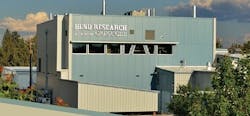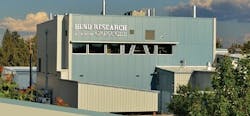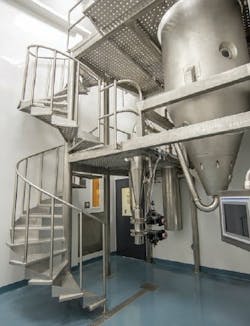Capsugel’s investment in the expansion of its pharmaceutical spray-dried dispersion commercial manufacturing capability at its Bend Research site is helping its clients tackle bioavailabilty challenges.
Capsugel has invested $25 million to expand its commercial SDD capabilities in Bend, Oregon.
A 2015 Kline market research analysis estimated that more than 80 percent of drug candidates in the R&D pipeline are poorly soluble in water. Poor solubility is one of the most frequent culprits of poor bioavailability and limited drug absorption. As drug manufacturers square off against these challenging drug development problems, they are looking for novel solutions to advance their difficult compounds to market. This is creating a growing market opportunity for solubilization enhancement technologies, with spray-dried dispersions (SDD) being a prime technology solution.Developing a deep scientific understanding of client drug development problems and matching that with the right technology is critical. Just ask Bend Research, a division of Capsugel Dosage Form Solutions. Bend Research has more than two decades of proven experience formulating more than 1,000 compounds using spray-dried dispersion technology.
“We find that the majority of pharmaceutical product pipelines need science and engineering support to meet performance, stability and manufacturability challenges,” explains Tanya Hayden, vice president at Bend Research and director of clinical and commercial manufacturing, Capsugel Dosage Form Solutions.
Capsugel, a global leader in providing high-quality hard capsules to the healthcare industry, launched its Dosage Form Solutions business unit in 2013 to significantly broaden its capabilities with a comprehensive suite of technologies and integrated solutions for designing, developing and manufacturing a wide range of finished dosage forms. In October 2013, Capsugel acquired Bend Research to provide the new business unit with an industry-leading position in bioavailability enhancement with access to a premiere suite of technologies to address customers’ most pressing formulation challenges for oral delivery.
EXPANDED COMMERCIAL-SCALE OPS
The recent completion of construction of Bend Research’s new pharmaceutical SDD commercial manufacturing facility in Bend, Oregon, includes approximately 6,000 square feet of highly optimized processing space that is already packing a big punch when it comes to tackling poorly soluble compounds. The new facility builds on Bend Research’s core R&D competencies in SDD technology, as well as its initial foray into SDD commercial manufacture.
Bend Research broke ground on the $25 million SDD commercial facility in late 2013 and completed construction in June 2015. The new facility, built alongside Bend Research’s existing GMP development and manufacturing facility, represented the company’s continued focus on developing and expanding its commercial-scale operations for SDD technology. With the facility’s completion, Bend Research has the largest integrated pharmaceutical SDD technology capability in North America.
The expansion enables Bend Research to leverage its expertise to support a growing pipeline of customer projects from early-stage development all the way through late-stage clinical and commercial manufacture.
WHY SPRAY DRYING?
This development spray dryer is used to scale up to the same size commercial dryer in the manufacturing facility.
Bend Research has developed solubilization bioavailability enhancement technologies with applicability at all stages of drug development, using a model-based approach to select the best technology for its clients’ compounds.“Spray-dried dispersions can solve a number of different formulations and/or stability or scale challenges, the most common of which is bioavailability enhancement,” explains Hayden.According to Hayden, spray-dried dispersion technology as a bioavailability enhancement solution is often favored. “SDD technology has a broad applicability across a wide range of API characteristics. It is a very robust and well understood technology and is very scalable,” says Hayden.
Essentially, the spray-drying process involves dissolving an API, and in this case a polymer excipient, into a solvent. The resulting solution is sprayed with a drying gas such that each droplet becomes a particle of drug uniformly dispersed in a polymer matrix — a homogenous amorphous dispersion. The resulting product is a powder that can then be utilized downstream in either capsule or tablet dosage forms.
BUILDING A LEADER IN SPRAY-DRIED DISPERSION
With the completion of the new facility, Bend Research now has three commercial scale spray dryers, not to mention mini, lab and pilot scale dryers on-site. One commercial scale spray dryer is dedicated to supporting development activities for clients. The other two, which are designed for cGMP commercial production, use innovative dryer design and manufacturing plant technology to offer a significantly improved product throughput that minimizes cycle times and maximizes productivity. The newest spray-drying unit is designed to accommodate high-potency compounds.
“As part of our quality-driven design, we wanted to make sure that the facility expansion considered design and engineering features that would allow us to manufacture higher-potency compounds with reduced risk,” says Hayden.
Producing high quality products was the primary driver behind facility design. “When we were designing the new facility, we wanted to make sure that we included ways to integrate automation technology. We put in new systems that allow our operators to monitor and control the process as well as provide real-time data feedback early to our clients to ensure that we’re getting the desired product quality as designed throughout the process.”
With its completed integrated SDD capability, and with the new facility already manufacturing commercial product, Bend Research — and parent company Capsugel — has solidified its place as a leader in offering spray-dried dispersion services to drug makers. Says Hayden, “We now have more technologies and capacity to bring the right solution to the right problem. It’s all about patient outcomes. And this facility expansion allows us to support that.”
About the Author
Karen P. Langhauser
Chief Content Director, Pharma Manufacturing
Karen currently serves as Pharma Manufacturing's chief content director.
Now having dedicated her entire career to b2b journalism, Karen got her start writing for Food Manufacturing magazine. She made the decision to trade food for drugs in 2013, when she joined Putman Media as the digital content manager for Pharma Manufacturing, later taking the helm on the brand in 2016.
As an award-winning journalist with 20+ years experience writing in the manufacturing space, Karen passionately believes that b2b content does not have to suck. As the content director, her ongoing mission has been to keep Pharma Manufacturing's editorial look, tone and content fresh and accessible.
Karen graduated with honors from Bucknell University, where she majored in English and played Division 1 softball for the Bison. Happily living in NJ's famed Asbury Park, Karen is a retired Garden State Rollergirl, known to the roller derby community as the 'Predator-in-Chief.'


